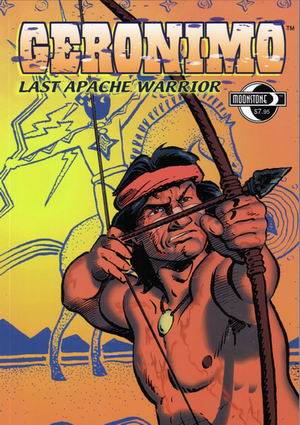Geronimo had agreed to stay on the San Carlos reservation a second time. For two years it seemed peace had arrived. Most of the Chiricahuas felt settled. But not Geronimo. He didn’t like farming and felt pushed around by white officials. Finally, he had had enough.
Let's note that most of the Chiricahuas had been settled for a decade or more. Even Geronimo had lived on the rez for six years. At this point I don't see how Geronimo could've claimed he was fighting for his people's freedom--not that he claimed that, of course.
In 1885, Geronimo and 150 Chiricahuas fled their homes in Turkey Creek. US troops pursued. It was Geronimo's third flight from servility.
According to Geronimo, the Indians killed anyone who crossed their path. Otherwise the survivors would inform the Army. "It was terrible to see little children killed," someone says, "but soldiers killed our children too."
At one point Geronimo feigned friendship with a rancher. After feasting on mutton, he shot and stabbed the host and his wife and children. He would’ve killed a White Mountain Apache family living on the ranch too, but members of his band intervened, forcing him to back down.
Historian Philip J. Deloria's take on this rampage:
You don’t take over a continent in an easy way, and you don't give up a continent without fighting hard. So there’s a long history that everyone understands, that that’s what the fight's about and it's going to be bloody and awful and violent and painful.
But by 1886, even Geronimo was getting tired of running. Morale was low and a sense of doom hung over the Chiricahua resistance. Geronimo negotiated terms of surrender with General Crook. If Geronimo's people spent two years in an East Coast prison, they could return to Arizona.
One last fling
Incredibly, Geronimo changed his mind and fled a fourth time. No one knows what he might've been thinking. "I don’t think he had a coherent plan for a survival strategy to last a decade," someone says.
"He gave no quarter to anyone, and asked no favors," said the narration.
Butchered
Bloodthirsty
Terrorism prevails
$2,000 for his head
Geronimo’s Death Demanded
Yet they never succeed in capturing a single man, woman, or child. "If that isn’t brilliant," someone says, "nothing is."
The narration sums up the popular view of Geronimo:
Geronimo assumes an important symbolic status. His resistance is seen as the last resistance, not only of Chiricahua Apache people, but of Indian people in North America.
A few thoughts
In his last two rampages, Geronimo acted like a criminal who's escaped from prison. People in this position often don't flee quietly to another state or country, which would be the smart thing to do. Instead, they go on a shooting spree, practically daring the authorities to catch them. This kind of irrational macho fever seems to have gripped Geronimo.
Of course, I'm sure the episode has exaggerated Geronimo's responsibility for everything that happened. At one point it mentions that Geronimo was Chief Juh's spokesman, but later Geronimo seems to be making the decisions and Juh is following him. This is what happens when you focus on one person's story.
I don't think the episode mentions any other Apache warriors--e.g., Mangas Coloradas, Victorio, Nana--by name. What were their roles and motivations in the Chiricahua resistance? Were they fighting for a principle or for personal reasons?
It's a shame Geronimo doesn't give us any death tolls or estimates. How many American soldiers and civilians did the Chiricahuas kill in raids and battles? How many Apache warriors and noncombatants did the Americans kill? This would give us a better sense of whether the response was proportional to the stimuli.
When people say Chiricahuas, Apaches, or Indians are "savage," how much of this feeling is based on Geronimo's final spree? A lot of it, apparently, even though only a few Chiricahuas were involved involved. Geronimo did some bad things, but it's grossly unfair to tar other Indians with the same broad brush.
For all the times Geronimo surrendered, it's interesting that the US didn't put him on trial or execute him summarily. Instead, it treated him as a prisoner of war. I wonder what's the story behind that.
Did the Americans calculate that Geronimo would go on fighting unless they took the death penalty off the table? Were they worried that legal proceedings would expose their official misconduct? A shrewd lawyer might've blamed the US for breaking its treaties and turning Geronimo into an enemy. Did they sincerely think Geronimo deserved to be treated as a POW rather than a criminal? Perhaps they didn't have enough evidence to convict him, or knew the charges against him were exaggerated.
If the people who knew Geronimo personally didn't execute him as a murderer, I don't think we should call him a murderer. Not without a few asterisks, at least. He was a complex figure, just as the show asserted.
For more on the subject, see Resistance in Geronimo and Review of Geronimo.
P.S. I'm guessing Geronimo didn't go around bare-chested shooting stone-tipped arrows most of the time.


No comments:
Post a Comment